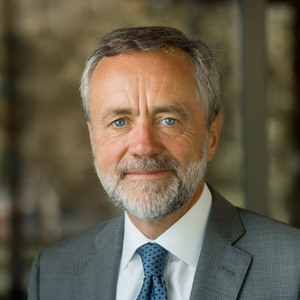I made the mistake a few years ago ‚ÄĒ before I came to Biola ‚ÄĒ of doubting an idea Charles Colson shared with me. At the time I was serving as dean at Gordon-Conwell Theological Seminary where Mr. Colson served as a trustee. He proposed our launching a lectureship on Christian worldview, involving a thoughtful contemporary book and its author.
I blathered out something to the effect that students are too busy, and one more lecture probably wouldn‚Äôt get much traction. He looked at me surprised, saying something like, ‚ÄúYou mean you don‚Äôt think the rising generation of students would flock to a lecture on the fundamental premise that truth is knowable and transcends all of God‚Äôs creation? What kind of students would not drop everything and come?‚ÄĚ
Obviously, Chuck Colson had weight behind his words, in both instinct and conviction. He was right. Each year of the Colson Lectureship on Christian Worldview, crowds of students came. Hungry to learn and be mobilized as ambassadors for living and believing the right thing, they showed up in droves.
A few years later I accepted the call to become president of ļŕ›ģ ”∆Ķ, and Chuck Colson took me aside and encouraged me to take on the role. I didn‚Äôt doubt him this time. He told me that this university was a place steeped in the best minds and the deepest convictions, all within a biblical framework.
Chuck Colson was a huge fan of Christian higher education that championed a biblical worldview. ļŕ›ģ ”∆Ķ was among the colleges and seminaries he believed in strongly. In a letter he wrote me in 2007 at the conclusion of President Clyde Cook‚Äôs 25 years of leadership, he affirmed Biola as ‚Äúone of the key institutions in the Kingdom.‚ÄĚ
Fast forward five years.
Fifty or so of us spent a day in Virginia with him on March 30, 2012. In his opening comments, Mr. Colson commented on how a physical setback kept him home for weeks, but he didn’t want to miss this gathering. He wanted to convene this group of leaders to discuss the progress made and the path before us. I spoke little that day and scribbled lots of notes, thinking about how Biola’s students needed more than ever to think Christianly at every level and across all disciplines. I listened carefully to the brilliant and passionate comments around the table from educators and leaders far wiser than I. But I especially listened to the octogenarian Chuck Colson, his voice still strong, his mind still keen, his convictions still compelling.
I didn’t know this would be his last such forum. Later that day someone contacted me saying Colson was helicoptered to a hospital in Fairfax. He never went home, until he went Home, three weeks and a day later.
I am not alone in higher education in being deeply grateful for the unwavering convictions Chuck Colson modeled. And we all knew his conviction and courage were lived out in his compassion, taking Christ‚Äôs words seriously in Matthew 25 and living out Hebrews 10, ‚Äúfor you had compassion on those in prison.‚ÄĚ
ļŕ›ģ ”∆Ķ is forever grateful to Chuck Colson both for his endorsement of our university‚Äôs mission but far more importantly for his own important work for the Kingdom of God. He was a prophetic voice in the culture, standing up against the rising tide of secularism and speaking out for morality based on God-given values. With him gone now, we are called to grab the mantle, joining the next generation of Christians around the globe to stand up for biblical truth even where it is increasingly unfashionable.
We, among many with kindred spirits at sister institutions, thank God for the life of Chuck Colson. Let us be inspired to follow his example of pursuing truth and preaching the gospel compassionately and articulately in whatever sphere of influence we find ourselves. ‚ÄúHow Now Shall we Live?‚ÄĚ is a question Colson posed in his book of that name, and I believe that question is as urgent now as ever.
On his shoulders and with the same faith, I am committed that ļŕ›ģ ”∆Ķ will grow even stronger in educating:
‚Ė∂ Students who leave Biola with a servant‚Äôs heart, who live lives of hope by seeing the world as a place God wants to redeem.
‚Ė∂ Students who believe it is a noble endeavor to live a life of bold faith, taking on challenges that demonstrate their commitment to a greater cause.
‚Ė∂ Students who speak courageously and compassionately about the Truth of God‚Äôs Word to an increasingly skeptical generation.
‚Ė∂ Students who understand the Word of God as the Bread of Life so they might clearly and passionately proclaim not only that there is truth, but that Jesus Christ is the Truth.
‚Ė∂ Students who understand the apostle Paul when he exhorts us to ‚Äúprepare ‚Ķ for works of service, so that the body of Christ may be built up.‚ÄĚ
‚Ė∂ Students whose lives are led from a position of biblical strength and not from one of fear or intimidation.
‚Ė∂ Students who will proclaim the gospel and teach it and live it and pray it toward the great spiritual renewal our world so desperately needs.
Barry H. Corey is the president of ļŕ›ģ ”∆Ķ. Visit his office online at www.biola.edu/president, on Facebook at and on Twitter at .
 ļŕ›ģ ”∆Ķ
ļŕ›ģ ”∆Ķ
.jpg)

